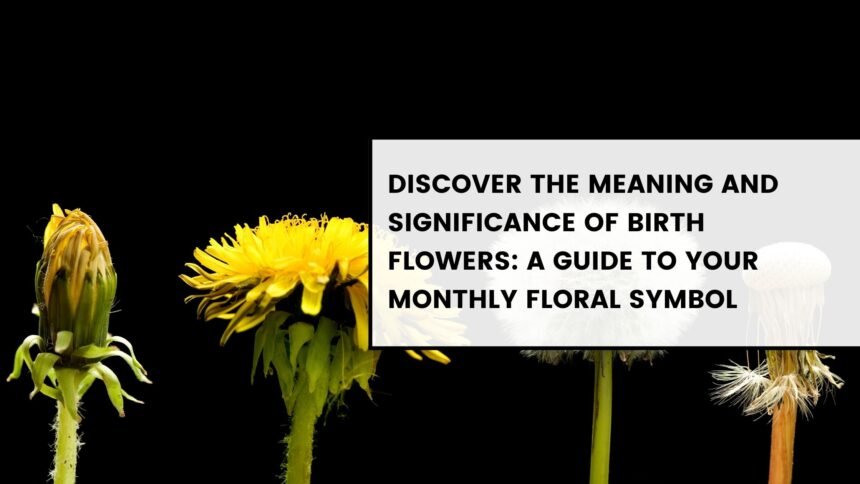Birth flowers, like birthstones, offer a unique and meaningful way to celebrate each month of the year. Whether you’re born in January or December, your birth flower represents qualities and traits associated with you and your birth month. These symbolic flowers are perfect for gifts, home decor, and personal mementos, providing a beautiful way to honor each individual’s personality and traits. In this guide, we’ll explore the unique birth flower for each month, uncover their meanings, and answer some of the most common questions to help you choose the perfect flower for birthdays, special occasions, or personal enjoyment.
What is a Birth Flower?
A birth flower is a specific flower associated with each month of the year. Just as zodiac signs reflect personality traits, birth flowers symbolize various attributes and emotions that can add meaning to gifts and celebrations. The concept of birth flowers is centuries old, originating from ancient cultures that believed flowers conveyed specific messages and sentiments.
Monthly Birth Flowers and Their Meanings
Here’s a breakdown of each month’s birth flower, its meanings, and how it connects to the individuals born in that month:
| Month | Birth Flower | Meaning | Alternative Flower |
|---|---|---|---|
| January | Carnation | Love, fascination, distinction | Snowdrop |
| February | Violet | Modesty, loyalty, faithfulness | Primrose |
| March | Daffodil | New beginnings, prosperity, joy | Jonquil |
| April | Daisy | Purity, innocence, true love | Sweet Pea |
| May | Lily of the Valley | Humility, sweetness, happiness | Hawthorn |
| June | Rose | Love, passion, beauty | Honeysuckle |
| July | Larkspur | Positivity, dignity, grace | Water Lily |
| August | Gladiolus | Strength, integrity, sincerity | Poppy |
| September | Aster | Wisdom, faith, valor | Morning Glory |
| October | Marigold | Warmth, passion, creativity | Cosmos |
| November | Chrysanthemum | Friendship, cheerfulness, honor | Peony |
| December | Holly | Protection, peace, goodwill | Narcissus |
Each birth flower holds unique symbolism and meaning, often representing specific qualities and emotions that resonate with the people born in that month.
In-Depth Look at Each Birth Flower
January: Carnation
Symbolism: Carnations are often associated with admiration and love. The soft petals and various colors make carnations an enduring favorite.
Fun Fact: Carnations are one of the oldest cultivated flowers, often used in bouquets and arrangements to convey appreciation and distinction.
February: Violet
Symbolism: Representing modesty and faithfulness, violets are a sign of love that withstands the test of time.
Story: In Victorian times, violets were used to symbolize quiet loyalty and devotion, often exchanged between close friends or lovers.
How to Use Birth Flowers in Your Daily Life
- Gift Bouquets: Birth flower bouquets make meaningful birthday gifts, adding a personal touch that celebrates the recipient.
- Home Décor: Displaying your birth flower in your home can create a sense of connection with your personality and enhance room ambiance.
- Jewelry and Accessories: Birth flower jewelry is increasingly popular, offering a way to keep the symbolic meaning close to you.
Common Questions about Birth Flowers
Can I have more than one birth flower?
Yes, many months have alternative birth flowers, allowing you to choose the one that resonates most with you.
What if I don’t like my birth flower?
Birth flowers are symbolic, and many people enjoy learning about other flowers’ meanings and incorporating them into their lives regardless of their birth month.
What if I don’t like my birth flower?
Birth flowers are symbolic, and many people enjoy learning about other flowers’ meanings and incorporating them into their lives regardless of their birth month.
Are birth flowers and zodiac flowers the same?
No, birth flowers are tied to calendar months, while zodiac flowers are associated with astrological signs, which don’t align perfectly with the months.
Practical Tips for Choosing Birth Flowers as Gifts
- Know the Color Symbolism: Different colors can change a flower’s meaning. For example, red carnations symbolize love, while white carnations signify purity.
- Consider Flower Alternatives: Some months offer more than one birth flower. This flexibility allows you to choose one that fits the recipient’s taste.
- Add a Personal Touch: Including a small card with the flower’s symbolism or a short poem can enhance the personal feel of the gift.
Birth Flowers and Their Importance in Various Cultures
Throughout history, different cultures have assigned unique meanings to flowers. In Japan, for example, the chrysanthemum represents longevity and rejuvenation, while in Western cultures, it often symbolizes friendship and respect.
Conclusion: Celebrating with Birth Flowers
Birth flowers provide a beautiful and meaningful way to celebrate life’s milestones and express love, friendship, and admiration. Whether you’re giving a birth flower bouquet, incorporating the symbolism into your home, or choosing jewelry that represents your birth month, birth flowers add layers of meaning and connection. Next time you’re looking for a gift or something special to honor a loved one, consider the timeless beauty and sentimentality of birth flowers.
Call to Action
Discover the perfect birth flower gift for your loved ones or yourself by exploring local florists or online flower shops. Embrace the symbolic power of flowers and make every celebration unforgettable!
This article offers a thorough overview of birth flowers and how they connect us to our birth month and personal qualities, blending traditional meaning with practical tips to incorporate birth flowers into our lives.

